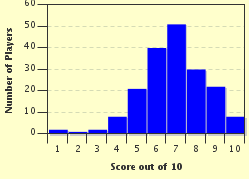Quiz Answer Key and Fun Facts
1. To persist in one's support of another through both easy and difficult times or to stay loyal to someone despite any obstacle that occurs is to be with that person "through thick and thin". What is the origin of this cliche?
2. A farmer wanted to buy a bull from his neighbor and expressed to him his desire. After several days of half-hearted haggling and pondering different prices and barters, the farmer went to his neighbor and said, "It's time to talk turkey". What did the farmer mean?
3. Richard tried to explain to his boss that the reason he had not finished the company's monthly report was that he had been ill and suffering from a great amount of pain and fatigue. His boss replied, "Tell it to the marines". What did his boss mean with such a response?
4. To "tilt at windmills" is to take on a ridiculous challenge or to fight against an imagined enemy or injustice. What famous literary work led to the creation of this expression?
5. If you wished to promote quite strongly an idea, program, or agenda, then what is it, according to an old cliche, that you would "thump"?
6. Act III, Scene I, from William Shakespeare's "Hamlet" is responsible for quite a number of expressions in our language. In addition to the beginning of Hamlet's famous soliloquy--"To be or not to be, that is the question"--consider the number of phrases from the following lines: ". . . To die, to sleep; / To sleep; perchance to dream: ay, there's the rub: / For in that sleep of death what dreams may come, / When we have shuffled off this mortal coil, / Must give us pause. . . . ". What is "the rub" that Hamlet refers to in his statement, "Ay, there's the rub"?
7. You may have noticed that when you wish to take an eye for an eye, trade insult for insult--essentially reciprocate in kind--that "tit" is always accompanied by what word specifically?
8. When someone is exceedingly drunk, so much so that he or she is stumbling and fumbling about, we often refer to that person as being "three sheets to the wind". What are the "sheets" that are referred to in this expression?
9. If someone wished to refer to another as unwaveringly faithful and loyal, then he or she would describe that individual as what?
10. When speaking facetiously, ironically, or insincerely, one is said to be speaking "tongue in cheek".
How did this expression come into existence?
Source: Author
alaspooryoric
This quiz was reviewed by FunTrivia editor
ponycargirl before going online.
Any errors found in FunTrivia content are routinely corrected through our feedback system.

